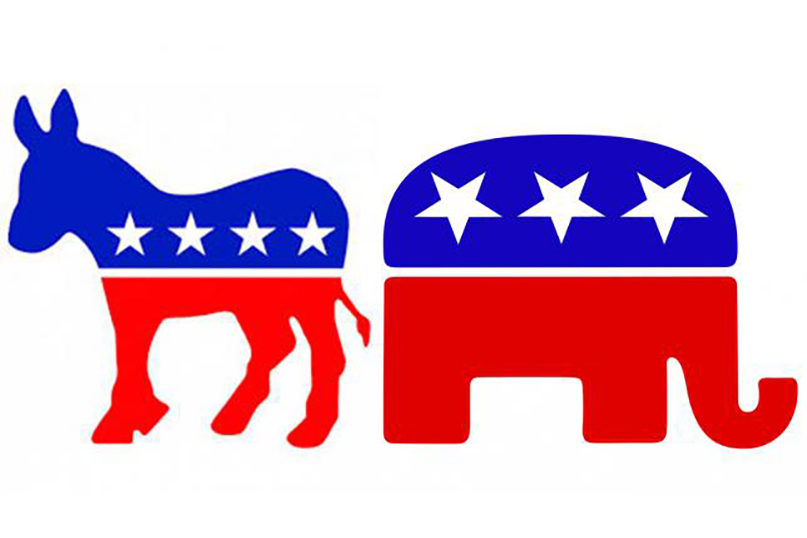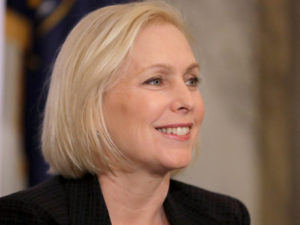
ON THE RECORD
Within the past two weeks, both U.S. Senator Kirsten Gillibrand (D-NY) and U.S. Congresswoman Tulsi Gabbard (D-HI) officially announced their entry into the race to become the 2020 Democratic nominee for President in the 2020 election. Here is a brief look at where they stand on issues related to Israel and the Middle East.
Senator Kirsten Gillibrand
By Jackson Richman
(JNS) Sen. Kirsten Gillibrand announced on Tuesday that she has set up an exploratory committee as she entered the 2020 Democratic primary for president.
From immigration to gun control and other issues, Gillibrand has flip-flopped on her stances. Some of those stances related to Israel are no exception, despite representing a state with the largest Jewish population in the United States with almost 1.76 million.
As a congresswoman from upstate New York, she held conservative viewpoints, even holding an “A” rating from the National Rifle Association that later turned to an “F” when she replaced Hillary Clinton as senator from the Democrat-leaning state in 2009.
On Iran nuclear deal
In September 2009, she released a statement that the “Iranian regime’s word cannot be trusted, and a nuclear Iran cannot be tolerated,” only to support “an imperfect Iran deal” in 2015.
“I have decided to support this deal after closely reading the agreement, participating in multiple classified briefings, questioning Energy Secretary [Ernest] Moniz and other officials, consulting independent arms control experts, and talking with many constituents who both support and oppose this deal,” wrote Gillibrand.
The senator slammed U.S. President Donald Trump for withdrawing the United States from the accord in May 2018.
“This unilateral decision will cost us the ability to maintain a strong coalition holding Iran accountable and the ability to increase leverage and oversight with our European allies,” she said.
On anti-BDS legislation
In 2017, she withdrew her sponsorship of the bipartisan Israel Anti-Boycott Act, citing criticism of it from the American Civil Liberties Union that it would infringe of freedom of speech. The bill would have amended the Export Administration Act of 1979, forbidding American firms from partaking in the Boycott, Divestment and Sanctions (BDS) movement, including boycotts advocated by international organizations such as the United Nations.
Gillibrand has not reversed her stance on anti-BDS legislation and has repeatedly voted, along with most of her fellow Democrats, not to advance a recent bill that enables state and local governments in the United States to fight anti-Israel initiatives.
She spoke at the 2017 Women’s March, a movement whose top leaders have been associated with antisemitism, including support for Nation of Islam leader Louis Farrakhan, though her involvement was early on in its activism. She did, however, pen a profile of the leaders, who were jointly listed as one of Time’s 100 most influential people in the world in 2017.
Calling the Women’s March “the most inspiring and transformational moment I’ve ever witnessed in politics,” she went on to write, “And it happened because four extraordinary women – Tamika Mallory, Bob Bland, Carmen Perez and Linda Sarsour – had the courage to take on something big, important and urgent, and never gave up. Because of their hard work, millions of people got off the sidelines, raised their voices and marched.”
“This is the rebirth of the women’s movement. These women are the suffragists of our time,” she added.
On Israel
Moreover, Gillibrand called for restraint on both sides of the Israel-Hamas conflict amid the terrorist group launching rockets from Gaza into Israel in November 2018.
“The escalation in violence on the Israel-Gaza border is deeply disturbing, and I am relieved that Israel’s missile defense programs were able to avert civilian fatalities from this disgraceful terror attack. I urge calm so the situation does not further escalate, and I still remain hopeful for a long-term, peaceful solution to this tragic conflict,” she said. “But the only way we will accomplish that is through negotiations that create conditions for safety and economic security–not through rocket attacks or any other acts of terrorism.”
At a July 2017 town hall, she questioned whether Israeli Prime Minister Benjamin Netanyahu is committed to negotiations.
“In our [2016] meeting [in Israel] with Prime Minister Netanyahu, the question we asked is, what is your vision for peace, and he didn’t have one,” she said. “He just said my only hope is that I protect my people from rockets. If you don’t have a vision, if you don’t have a plan, then it is never going to happen. And so we do need to require more of our world leaders, and I think a call to action to Israel’s government to have a plan for peace is really incumbent on all of us.”
Nonetheless, Gillibrand has condemned the prevalent anti-Israel bias at the United Nations.
In January 2017, she supported a Senate resolution to refute U.N. Security Council Resolution 2334, condemning Israeli neighborhoods in Judea and Samaria. The United States abstained from voting, thereby allowing it to pass. The following April, Gillibrand signed a joint letter to U.N. Secretary General António Guterres, calling for the end of the world body’s animosity towards the Jewish state.
Whether Gillibrand will change her past stances, including on issues where she has already done a reversal, on the campaign trail will be something to watch.
Rep. Tulsi Gabbard
By Jackson Richman
 (JNS) Serving in Congress since 2013, Gabbard’s record on Israel is, at best, mixed, though she has known to defend Syrian dictator Bashar Assad and Russian President Vladimir Putin, both associated with using chemical weapons on the Syrian people, and for aligning themselves with Iran and its proxies, such as the U.S.-designated terrorist group Hezbollah.
(JNS) Serving in Congress since 2013, Gabbard’s record on Israel is, at best, mixed, though she has known to defend Syrian dictator Bashar Assad and Russian President Vladimir Putin, both associated with using chemical weapons on the Syrian people, and for aligning themselves with Iran and its proxies, such as the U.S.-designated terrorist group Hezbollah.
Gabbard met Assad in Syria in January 2017 to the dismay of her fellow lawmakers.
“Sitting high above his torture cells in Damascus, Assad is giddily crafting his wish list for the Tulsi campaign,” tweeted Rep. Adam Kinzinger (R-Ill.), a frequent critic of Gabbard.
Gabbard supported the 2015 Iran nuclear deal and voted for it, she said, “not because it’s a great deal or even a good deal. I voted for it because I could not find a better alternative.”
At the annual Christians United for Israel summit in Washington that year, she said: “It’s easy to say that there’s no trust between our two countries (the U.S. and Iran), but without that mechanism for verification, then any potential agreement really becomes a joke,” mentioning that sanctions relief “must be tied to Iran’s compliance to the deal.”
In 2016, the congresswoman was honored by Rabbi Shmuley Boteach for being “a strong advocate for national defense and for veterans.”
On Middle East issues
Although she was not one of nearly 60 Democrats who boycotted Israeli Prime Minister Benjamin Netanyahu’s March 2015 address to a joint session of Congress, warning about the prospects of a nuclear Iran, Gabbard said: “It’s unfortunate that an issue as important as preventing Iran from obtaining nuclear weapons has been muddled by partisan politics. This is an extremely serious issue, at a critical juncture, that should not be used as a political football.”
She continued that the U.S.-Israel relationship “must rise above the political fray, as America continues to stand with Israel as her strongest ally.”
Gabbard voted against a passed House resolution in January 2017 to refute U.N. Security Council Resolution 2334, condemning Israeli neighborhoods in Judea and Samaria.
“I know how important our enduring alliance with Israel is,” she said. “My vote upholds my commitment to maintaining and strengthening this alliance, as well as my long-held position that the most viable path to peace between Israel and Palestine can be found through both sides negotiating a two-state solution. While I remain concerned about aspects of the U.N. resolution, I share the Obama administration’s reservation about the harmful impact Israeli settlement activity has on the prospects for peace.”
On Iran nuclear deal
She slammed U.S. President Donald Trump for withdrawing America from the 2015 Iran nuclear deal in May 2018.
“President Trump’s decision to withdraw from the Iran nuclear deal dangerously increases the likelihood of war and undermines approaching talks with Kim Jong-un to denuclearize North Korea,” she said. “While the Iran deal is far from perfect, Iran is in compliance and the deal is working by preventing Iran from acquiring a nuclear weapon and preventing an all-out war. The concerns regarding other issues like Iran’s missile program should be addressed outside of the existing nuclear deal.”
She continued, “Breaking this commitment that the U.S. made to Iran and our allies will likely push Iran to restart its nuclear-weapons program, increase the potential of war and undermine critical negotiations to denuclearize North Korea – a country that already has nuclear weapons that threaten Hawaii and the United States.”
“This short-sighted decision ruins already damaged U.S. global credibility, proving that the U.S. cannot be trusted to keep its promises,” she added.
In May 2018, she criticized Israel defending itself against Hamas-inspired riots along the Gaza fence: “Israel needs to stop using live ammunition in its response to unarmed protesters in Gaza. It has resulted in over 50 dead and thousands seriously wounded.”
Whether Gabbard will change or stick with her viewpoints on the campaign trail is to be determined. She is projected to be a dark horse in the presidential race.








 Southern New England Jewish Ledger
Southern New England Jewish Ledger











